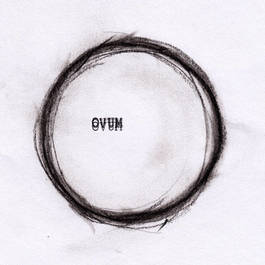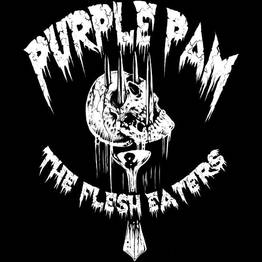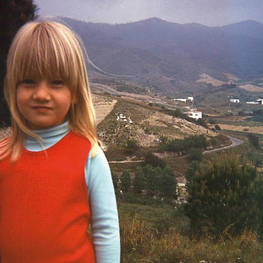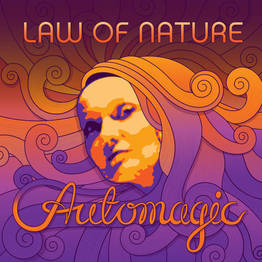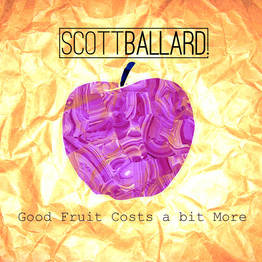|
As a man who craves solitude I can say that it takes a certain kind of person to be able to handle it whether it’s wanted or not. Spend enough time alone and an audible sigh becomes like a rhetorical question to yourself, you begin to think out loud nearly always, and when you’re having a bad day or really drunk things can sometimes get a bit hairy. You wake up to messages scrawled in a hand that doesn’t resemble your own, telling you things only you would know. And though I’ve chosen a more unoccupied life for myself, there are often many who do not, whose seclusion is forced upon them by some cruel fate. There are some who never make use of this period of isolation and others, like the UK based artist TK who performs under the moniker Tigermask, who uses his solitude to ponder the very means of existence.
TK was housebound for nearly a decade due to an illness, which he suffered from his late teens to his early twenties. In the spring of 2014 TK emerged from the cocoon of his illness and began to take an interest in music. His inspiration came from a box of records left behind by his older brother and a pirated copy of Cubase. As he slowly began to record songs, he was also teaching himself how to play the many instruments (guitar, harmonica, double bass, piano and violin) he used to record his first record Ovum. In a very scant way Ovum reminded me of another holed up solo recording centered on isolation and illness, Bon Iver’s For Emma Forever Ago. After a brief opening track of a fly buzzing and some ethereal feedback we get “Womb” which begins with gospel hymn hums acoustic guitar pricks and a music box piano jingle. “I can’t go out/I can’t stay in” TK laments his dilemma matter-of-factly as cowboy campfire harmonica buzzes sweetly in the background. On “Vernal Interstice” TK again uses his beautifully spooky choir-like harmonies to great effect, making his voice sound ironically enough for his situation like many. Later on “Moon” and “Wide Eyes” he ditches these wide effects and becomes more personal, his vocals deeper as he sings, “Have I ever felt so alone?” before breaking off into a creepy whistle solo. So much of what makes Ovum such a pleasure to listen to is its sparseness and silences. They resonate and often become a bigger and richer part of the song than the spare bits of instrumentation. Songs like “Bleeding Eye Omen,” “Leaves” and the six-minutes of static and tape hiss that is “The Demon in the Silence” in anyone else’s hands would seem like sketches at best, but this is a territory that Tigermask has known for a long while and he claims it as his own. Ovum is intended to be the first of a trio of concept albums, which Tigermask intends to put out. Although two and three are not yet recorded I am already interested to see if there will be a progression to a somewhat fuller and more open sound to the next record, now that TK is able to live outside his own mind. For now though I’ll enjoy listening to Ovum in my self-imposed solitude.
5 Comments
In one of my favorite Simpsons episodes Homer changes his name to Max Power. “Great name” another character says to which Homer replies, “Yeah isn’t it. I got it off a hair dryer.” It’s simple genius. I got the same feeling of encountering simple genius when I started listening to the three-piece New Zealand slack-pop outfit Lawnmaster’s brand new record Bad Entertainer. It’s proof that members Ken Double, Allan Street and John McDonald are masters of their craft, which is lo-fi pop tunes in the vein of Pavement and Big Star.
Though these bands may seem at opposite ends of the musical spectrum, one thing that unites them, and thus Lawnmaster, is that they write super catchy songs but don’t do so in the conventional way, not only with sugar baited hooks, but with a combination of sometimes funny, sometimes serious lyrics, and chord progressions that stay in you like a virus you can’t shake. In other words they make you think. Bad Entertainer is chock full of lo-fi head bobbing tunes. “You were the best/The best at making someone think the best is yet to come,” front man Ken Double states with a cheeky aplomb on the album’s opener “Please Don't” a stripped down yet melodically full slice of clean jangle pop. Next comes “Go to Auckland” a pounding deluge of power pop replete with handclaps and a punchy chorus. On “Disneyland” Lawnmaster slows down the pace but keeps up the rock with wailing guitars over which Double somberly sings about the happiest place on earth. Lawnmaster hits a beautiful pop-fervent stride on “Bowels of Me” which contains one of the damn catchiest guitar riffs you’ll here anywhere ever. “Nobody Gets the Blues No More” with its wanking heavy metal solos and tongue in cheek lyrics seems a direct ode to Malkmus and Co. as does the jaunty rocker “Down the Ladders and Up the Snakes.” With Bad Entertainer Lawnmaster has added an enjoyable pop record to the world’s cannon, which is nothing new of course, though I doubt Lawnmaster ever set out to break new ground in the rock and pop world. They’re too smart for that. The real genius behind Bad Entertainer is its perfect balance between the catchy and the kitschy with neither of these elements coming on too strong. If you don’t like this Bad Entertainer, you don’t like music.
Become A Fan
The pictures of Purple Pam and the Flesh Eaters on their Bandcamp page look like they are playing a set at CBGB’s with The New York Dolls and The Misfits. When I took a listen to their album Victory On Your Deathbed my suspicions were confirmed that their music is in that vein.
The four-piece band consisting of Purple Pam (guitar), Merx Mercado (bass), Daniel Martinez (drums) and Jeanne Carno-Rosenberg (vocals) formed four years ago but only recently released Victory On Your Deathbed, which is their debut. The album is well produced and well recorded but certainly captures the energy of a live band. This band at their core is a rock band. Sure you can point to other genres here and there but this band plays music you want to hear when you want to rock out. The songs are catchy, concise and don’t dilly-dally around. Take for instance the opener “Bring It On” which starts with a barrage of drums, waves of distorted guitar and a steady bass. Rosenberg is already into the first verse by the thirty-second mark and a little after the two-minute-mark they change time giving the song a sludgy metal vibe. The vocals absolutely soar on this track. I was reminded of The Savages a number of times. The intensity continues with “Identity” which just demolishes your face with blistering riffs and a heavy bass line. I loved how Rosenberg contorted her voice and the lyrics fit the title of the song perfectly. There is a bit of blues on “Tired of Being Alive” and it also has an impressive amount of guitar riffs, which come one after another while “Call You Out” feels like you're being pulled back and forth in every direction. They close with “Dark” which is an apt title and comes closest to sounding like drone metal. The distortion drips like wax on a burning candle around the vocals. That being said there are some changes in energy I wasn’t expecting. Overall, Victory On Your Deathbed is a great EP. The band delivers on all fronts and if you enjoy adrenaline-fueled rock that has a bit of an attitude then you won’t want to pass this one up.
Become A Fan
Songs For The Broken Hearted is the debut album by serac. There is a lot of REM and Nick Drake influence thrown in throughout which fuses well together. Overall, the production on the album is quite busy, obscuring some of the songs that exist within.
The best song on the album is “Close My Eyes” which is the only one performed solo acoustic. Here, the voice and lyrics have room to stretch and find themselves and use the space to fill in the sound. Other songs that stand out include “Time Will Tell” which swirling organs and a Pink Moon-ish vibe and “Too Late For Us Now” which is an up tempo rocker. “Lost” could be an outtake from mid ‘80s REM with Michael Stipe-ish vocal inflections and Mike Mills-ish harmonies. Other songs end up being too busy with guitar lines and drums shoving their way to the front. The organ ostinado on “The Moon and The Star” ends up being so constant and upfront, it’s hard to hear the lush harmonies that exist underneath. Other times cellos and perhaps violas lack intonation and distract from the rest of the songs. Songs like “Misunderstood’ all have good parts between electric piano and electric guitar with magnificent tones but hearing them always at once takes away from letting them coexist within the song and support it. In general the harmony vocals really are the saving grace on the album, filling up the space with a haunting lushness that equally finds its way to blend into the organ as much as the lead vocal. They lend a lot of support and elevate the dynamics of certain sections. The lead vocals are good moving between the aforementioned Nick Drake and Michael Stipe within their influences. Unfortunately some of them don’t have the same dynamic as the rest of the band, not rising to the energy of the rest of the band (perhaps as a result of being recorded before the rest of the band was recorded). The album closes with the anthemic “Break Your Heart” which builds really nicely adding in drums and competing guitar lines. It’s a nice well-developed ending, and is a technique that would be nice to have been applied to the preceding twelve songs in giving them more development. The songs are nice folk songs and when they have that space to stretch and breathe, they really shine.
Dublin-based singer songwriter Dave Thomas is the core member of Square Revolution, a musical project that ventures through electronic and acoustic instrumentation in both solo and full-band songs on his self-titled album Square Revolution.
The first song on the release “Pattern” features a droning synthesizer creating an ambient backdrop for Thomas’ soft and minimalist vocals. Thomas shows great patience in this specimen of songwriting, as he is content with letting chords and harmonies reverberate and build upon themselves without rushing to the next line or note. Eventually, a strict beat brings order to the free-flowing form, but the song maintains a carefree aura throughout. “Baby Blue Tears” employs acoustic guitars and blends it with electric guitars and synthesized drums to generate a truly unique sound, overlayed by Thomas’ hovering vocals. This song is very catchy and danceable, and provides a stark contrast with the next song “Always Say Goodbye” a downtempo, lyrically driven R&B-esque ballad. Creative use of static and reverb make for an enjoyable listen. Rich, full strings begin “Quartet” with a beautiful cascade and are joined by Thomas’ guitar, and occasionally by his vocals, in this mostly instrumental track. Various musical techniques, such as delicate fingerpicking and unconventional chord structures, bring life to this extremely soothing piece. The album ends with “A Bridge” which echoes themes from the first song of the record in its approach to quiet and slow droning instruments and soft vocals. The tune gradually builds, and then falls into silence as the curtain falls on Square Revolution. The outright talent evident in this release speaks to the skills and innovative spirit that Dave Thomas brings to his music.
I would have never have guessed from the lyrics and vocal delivery on Between Two Cities that Zach Kleisinger is only nineteen years old and looks every bit his age. He has a stoic, deep, soulful voice and sings about the lonely, empty feelings that have been with him since he left his hometown.
Between Two Cities is all about his vocals and guitar. There is other instrumentation but when it does appear it's low in the mix. The vocals and guitar sound as if they are about one foot away from you, which is perfect for the type of music he is playing. The songs on Between Two Cities are sparse but powerful. For instance the exceptional opener “I Was Your Drug” could have easily been backed up with more percussion, drums and bass. The aesthetic decision to keep it simple works out for Kleisinger. In fact I was reminded of the band War on Drugs when listening to this song. The guitar and vocals are the two main elements but the organ is a very nice touch. I thought the reverb on the guitars sounded great. It gave the song a very atmospheric feel but wasn’t too drenched in reverb where the notes sounded like they were being played in a cave. The lyrics are quite poetic and mostly come in the form of questions. He sings, “where is it you’re staying on a night like this? can I truly be too sure that you even exist?” He lifts up the mood ever so slightly with the next track “Quit Thinkin'.” The percussion is very well done. It is subtle and strategically placed to emphasize certain sections. “How Are You?” is a beautiful, melancholy song that is heartbreaking. He sings, “if you asked me how I was, I’d say “I’m doing fine” and if you asked me if I had a girl, I’d say “yes, and she’s all mine” but how are you? can you hear me through this phone? how are you? that’s what I really wanna know.” Kleisinger shows off some of his lead guitar skills on “What's The Use Now?” while the closer “Chase Away The Moonlight” is a bluesy, melodic song with a tinge of hope. Between Two Cities is a great EP any way you look at it but the fact that Kleisinger is barely out of high school needs to be acknowledged. The fact that he is putting on this caliber of material is impressive and certainly points for better things to come. If he keeps improving it’s certainly within the realm of possibility that he can make a living off this music thing.
Jo Atto is an eighteen year old who recently released a five-song EP entitled Glass Years. Atto claims to use traditional West African rhythms but his music doesn’t sound anything like Paul Simon or Vampire Weekend even though it is guitar based.
Atto displays a lot of talent on Glass Years in both his sense of traditional songwriting and the willingness to experiment. There is a lot to appreciate here. He has a good, aesthetically pleasing voice while getting quite creative with the music. The thing holding back Glass Years isn’t the songwriting or the delivery but the recording quality. In fact the problem arises on a number of songs and is quite specific. There are simply too many high frequencies in some of these songs, which could have been shaved off with a low pass filter. If for no other reason recordings with this issue are hard to listen to because when you crank them, they often leave your ears ringing. The album opens with “Small Sun” and I was immediately impressed by the inventive timing and cascading melodies. It’s obvious that Atto has some skill on the guitar and I thought the juxtaposition between the guitar pattern and the vocal melody was very engaging. “Sit & Think” is another success, which introduces complex rhythms while implementing a catchy vocal melody. Aside from the guitar Atto incorporates what sounds like a flute. Atto sings with certainty, “It will all make sense.” “What Grows” contains what sounds like a sample of Jim Morrison while “Unclear Light” has an undercurrent of kinetic energy. The lyrics on “Unclear Light” are some of the best. He sings, “And now you find / Beneath the lies / Is unclear orange nonsense / Scribbled there / Scrawled so bare / Symbols written without context / A masterpiece to behold.”He closes with “Kill Us All” which is free of percussive elements. Glass Years is most likely just the beginning of better things to come for Atto. He built a solid foundation with this EP and I hope to hear more soon.
Automagic by Law Of Nature is a fantastic album combining elements of Timbuk Three, The Handsome Family, Alison Krauss and more. Utilizing male and female vocals that harmonize extremely well with each other, the album is full of combinations of roots and alternative rock with doses of electronica and the avant-garde thrown in for good measure.
The album finds great balance between the voices, each one contributing both to the lead and harmony. Some of the best ones include “The Time,” “Tame” and “Rain.” The guitar solos are all quite exciting as well, with nimble runs and arpeggios, particularly on the opening track, “Anything I Want,” “Fade Away,” and the harmonized squeals over the blues progression of “Brother.” Among the influences, the band channels The Civil Wars on “Into The Fading Light” before moving into the rolling snare drum country stomp a la Mumford & Sons. “I Will Not Let You Go” could be a Brill Building/Neil Diamond song through a slightly obscured mirror with its pulsing piano octaves and quarter note strings. “Take Your Place” has some solo Eric Clapton in the vocal melody as well as the guitar interjections and tone. “Take It The Wrong Way” is a power pop song with pizzicato strings and a bounce-y melody. “Belong” goes through several time signature changes and is anchored by chugging electric guitars and a piano countermelody that sneaks in now and again. In other places like “Tame” a slick bass line propels the song through lush piano chords and the use of a timpani helps accentuate key moments. The only potential misstep on the album is “You’re Not Alone” which successfully incorporates electronic drums and some synths but hangs on one chord for quite a while in the instrumental, never really taking off or building.The album closes (fittingly) with “Start Again” which is driven by a sixteenth note-based bass line, which is later joined by palm-muted electric guitar. It works for a great slow build so that by the end of the song there is an explosion of emotion as the vocal holds down a repeated mantra of the title while Mike Garson-esque piano arpeggios sweep back and forth around it. With great songwriting, great production and excellent performances, the album really showcases the many strengths of Law Of Nature, embracing their influences but incorporating them into their own music rather than copying them.
Become A Fan
The Flips consisting of Nick Sintos (guitar/vocals), Mike Carlson (drums/vocals), Dustin Martin (guitar), Annette Nowacki (keys/vocals/percussion) and Mac Kelem (bass/vocals) recently released their second album entitled Better Days. The title seems appropriate when considering some of the trials and tribulations that Sintos has been through and where he was at emotionally during the time he wrote the songs.
Better Days brings you emotionally heavy rock music that feels heartfelt and cathartic. It seemed obvious to me through the lyrics that making the music was probably therapeutic to Sintos and the rest of the band. The title track starts off the album and seemed in many ways like the turning point for better days. Lyrics like “Head in hands, left out and left alone again / What’s the plan, save face and fight off all you can / We’re horrible and plain” and “I’m so ashamed of what I had to say / And I can’t wait for better pastures” seem to suggest someone who is at their lowest point but in the back of their mind understands that all things pass and things will get better. The next song “Take Cover” which is covered in white noise from the guitar deals with a similar subject of someone who is at end of their rope and having to dig deep in order to embrace the light on the other side. Sintos stretches his vocal chords and the delivery is intense when he sings, “Take Cover / I’m turning / And I don’t feel fine / You notice I own this I don’t feel fine.” As the album progresses the band continues to turn out catchy, cathartic rock with songs like “Selfish” and “Down In Waves.” One of the highlights is “Doubt” which reminded me of The Smashing Pumpkins in a numbers of ways. The song is heavy and really breaks down what this entire album seems to be about. Sintos sings about the light vs. the dark, the past and the future and the constant battle of emotions that leave him apprehensive. Better Days feels like an incredibly personal album and I think because of that a lot of people can relate to it. The inner struggle that Sintos sings about is in all of us to some degree. We as humans battle with our fears and doubts and being able to find the will to persevere to see better days instead of giving in when we are at our lowest is a remarkable thing.
Scott Ballard is no newcomer to the music scene. He was in bands such as The Freefall, The KJO Radio Band and August Underground and is also a music teacher at a local college. Ballard recently released Good Fruit Costs a bit More which at the end of the day is a pop album. Most of the songs feel light, acoustic and are easy to appreciate. Ballard’s songwriting is simple yet effective. He utilizes basic chord progressions and familiar structures that work to his advantage.
In terms of production and recording quality everything sounds top notch from the low end to the amount of reverb he places on his vocals. Suffice it to say these songs are radio ready. First up is “Hail’ which starts off with his vocals and acoustic guitar. It is apparent right away that Ballard has a good voice. He sings, “Please don’t follow me / Provide some space and I will Hail, Hail oh tonight /I’ve heard of stubborn pride / and we’ll lose all tonight if we Hail, / If only for tonight / And we’ll prove.” The song starts to feel inspirational and hopeful but is also quite dynamic when it chooses to push towards a crescendo. Up next is “He Said” which is loose, upbeat and has more of a happy go lucky vibe. The chorus is great when he sings, “Oh oh man, Amen / Oh oh man, Amen.” There are definitely some religious overtones but it doesn’t feel overt. “Conscript Me” on top of being well written contains well-placed orchestral strings while “Turned My Life Around” is almost hyperbolically optimistic. He closes with “Normal Life” which is arguably the highlight on the EP. I was reminded of The Lumineers when listening to it and it is a song that you could imagine people really enjoying in a live environment. Good Fruit Costs a bit More is a swift EP that goes by quickly. The songs are the type that can work in almost any circumstance. You can play them at a party, listen to them while preparing breakfast or even when working out.
|
Critique/insightWe are dedicated to informing the public about the different types of independent music that is available for your listening pleasure as well as giving the artist a professional critique from a seasoned music geek. We critique a wide variety of niche genres like experimental, IDM, electronic, ambient, shoegaze and much more.
Are you one of our faithful visitors who enjoys our website? Like us on Facebook
Archives
July 2024
|

